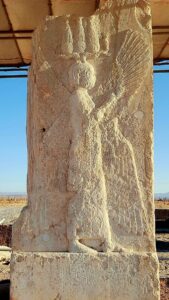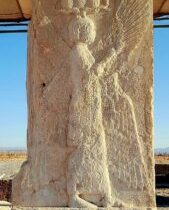Beyond Tribal Boundaries
 When the Jewish people returned from Egypt and moved into the land west of the Jordan River, they were organized into communities descended from Jacob, who was also known as Israel. These communities were called tribes. According to tradition, there were twelve tribes or very large extended families, each with land assigned to its members.
When the Jewish people returned from Egypt and moved into the land west of the Jordan River, they were organized into communities descended from Jacob, who was also known as Israel. These communities were called tribes. According to tradition, there were twelve tribes or very large extended families, each with land assigned to its members.
The tribes mostly got along with each other, but not with outside peoples. During the years described in the Hebrew Scriptures, there were many wars with neighboring peoples. Eventually, only a couple of the original tribes remained. Those were conquered by the Babylonians and carried off into exile.
Babylon was a powerful nation, but there was another powerful nation to the east – Persia. When Cyrus II, King of Persia, came to power and conquered Babylon, he ordered the release of the Hebrew people, allowing them to return to their land, the territory around Jerusalem in 538 BCE.
Cyrus ruled an empire that stretched from the Mediterranean Sea to the Indus River by the time of his death. He is recognized as the founder of a great line of kings of Persia. His rule was characterized by a willingness to allow conquered peoples to continue some self-governance and maintain their own traditions.
We hear of Cyrus’ role in the history of Israel through the prophet Isaiah. “Thus says the Lord to his anointed, Cyrus…” The Lord has chosen Cyrus to subdue many nations for the sake of Israel, the Lord’s “chosen one.” Note that Cyrus is called the anointed by God in this prophecy. This term used for anointed is the Hebrew word we translate as Messiah – one chosen and anointed for a particular role. (Is 45:1, 4-6)
God has chosen Cyrus for a specific mission in Salvation History – to return the Hebrew people to their own land. God is not limited by the categories or boundaries of human societies. God works in many cultures and through the interactions of many nations and peoples. As humans, we don’t always see the presence of God in our world and in the events that are taking place. Which of the Israelites in exile in Babylon would have guessed that Cyrus would be the one who would order their return home? Yet, the Lord called him for this purpose, according to Isaiah.
Many centuries later, another one called Messiah was asked a question intended to trick him into taking a position that would either get him in trouble with the people or with the Romans who had conquered his country. The questioners were Pharisees, teachers of the Law. The question was, “Is it lawful to pay the census tax to Caesar or not?” Caesar was ruler of Rome and by extension of the land of Israel. If Jesus said the tax was legal, the people would be upset with him. If he said the tax should not be paid, the Romans would have grounds to arrest him.
Jesus could see what they were up to. “Show me the coin that pays the census tax.” The coin was a Roman one, with a picture of the emperor on it. Jews were not allowed to make pictures of people or animals, so there would not be any worship of idols. Yet one of those who questioned him pulled out one of the coins and handed it to him. There were other forms of money used among the people. This coin was not typically used in daily life. It was a Roman coin. Jesus asked whose image was on the coin and what was the name written on it. They replied that it was Caesar.
Jesus knew who it was and what it said, but he asked the question to make it clear that other forces are at play in societies and in world affairs. “Then repay to Caesar what belongs to Caesar and to God what belongs to God.” (Mt 22:15-21)
The presence of the Romans in Israel, the status of the Jewish people as subjects of Rome, and the laws governing this small, conquered country all played a role in the way the proclamation of the Good News by Jesus and later by his followers led to the events of his life, including his death and resurrection. The spread of the news of his coming and of the reconciliation between humans and God that he brought was made far easier by the fact that Rome ruled so much of the world at that time. Travel was common, roads had been built and maintained, trade was flourishing, and the world was mostly at peace.
The growth of the community was not unopposed. Difficulties were common. But the word was received and communities of faith grew. Paul and the others who carried the Good News through the surrounding countries and even to Rome rejoiced in the growth in the numbers of believers. They reminded those new sisters and brothers of God’s love for them and the power of the Holy Spirit, who had come to them and given them strength to live this new way of life. (1 Thes 1:1-5b)
God’s presence and action in the world reaches beyond all boundaries of human communities and traditions. God works to bring good from all that happens. Doors open. Opportunities appear for healing and peace-making. Boundaries break down.
As wars continue in our world today, let’s pray for those in a position to work for international peace, especially for peace between nations that are neighbors and may share some common history. We pray that the Lord will touch the hearts of all involved and help them to see a way forward that allows peoples to live in peace and to grow in wisdom and justice and mercy.
Come, Holy Spirit. Breathe into our hearts the fire of love, that we may be peacemakers in our own small worlds. Then take that power of peace and move it to the larger stages of life in this world of yours. Surprise us again with the blessings of your love.
Readings for the Twenty-ninth Sunday in Ordinary Time – Cycle A










